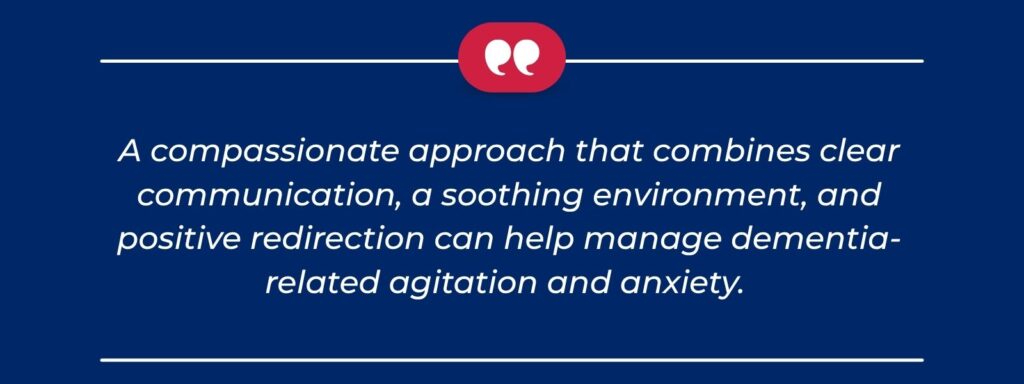Supporting a loved one with dementia can bring moments that feel confusing and emotionally heavy, especially when agitation or anxiety appears without warning. These behaviors can change the tone of a day quickly, and many caregivers are left wondering what to say or how to help. This is where practical techniques make caregiving feel more manageable.
A compassionate approach that combines clear communication, a soothing environment, and positive redirection can help manage dementia-related agitation and anxiety. Pairing these strategies with gentle redirection can turn tense moments into opportunities for comfort. Combined, these small actions can help your loved one feel safer, more understood, and better supported throughout the day.
Key Takeaways
- Recognize that agitation can come from confusion, discomfort, or an overstimulating environment.
- Communicate using a calm tone, simple sentences, and patient listening to provide reassurance.
- Create a soothing space by reducing clutter, lowering noise, and incorporating familiar items.
- Redirect attention with simple, enjoyable activities like listening to music or looking at old photos.
- Consider professional support options like memory care or respite care to find the right level of assistance.
What Agitation and Anxiety Can Look Like with Dementia
Agitation and anxiety can show up differently depending on the person and the stage of dementia. These behaviors aren’t usually random, either. They often reflect emotions or needs that a loved one can’t easily express.
This often looks like:
- Restlessness or pacing
- Repetitive movements or speech
- Heightened irritability
- Resistance during care tasks
- Confusion when routines change
- Physical signs of discomfort, like frowning or pulling away
Sometimes, these feelings are a response to confusion, physical discomfort, or a change in their routine or surroundings. Each of these behaviors can be a form of communication as your loved one tries to show that something doesn’t feel right.
How to Manage Agitation and Anxiety in Dementia Care
Managing agitation often involves small, everyday adjustments that make your loved one feel more secure. Each person’s needs are different, so trying a few different approaches can help you discover what works best.
Use a Calm and Gentle Tone
A calm tone of voice can shift the mood of a moment almost instantly. Speaking slowly and softly helps reduce overstimulation while signaling that the situation is safe. Even when a loved one seems upset, your tone can serve as an anchor they can rely on. Keep your voice steady and relaxed so they feel supported rather than rushed or overwhelmed.
Keep Sentences Simple and Direct
Simple, direct sentences are easier for a loved one with dementia to follow. Long or complex explanations can lead to confusion and increase frustration. So, try asking one question at a time to help them stay oriented in the moment. This approach also gives them space to respond without feeling pressured.
Listen with Patience and Empathy
Listening with patience allows your loved one to express feelings at their own pace. Even if the words don’t fully make sense, the emotion behind them is often clear. Reflecting those emotions back can bring comfort and validation. This kind of patient listening helps defuse tension and strengthens trust.
Focus on Nonverbal Cues
Nonverbal signals often speak louder than words for people living with dementia. Facial expressions, gestures, and posture can reveal discomfort long before agitation escalates. A gentle touch on the hand or a warm smile can offer grounding support. Eye contact, when welcomed, can also ease feelings of disconnection.
Create a Calm, Predictable Environment
A predictable environment reduces the mental load of navigating daily life with dementia. Lowering background noise, softening lighting, and reducing clutter can help limit sensory overload. These small adjustments help create a space where your loved one feels more settled.

When to Think About Memory Care for a Loved One with Dementia
Memory care can offer a structured, supportive setting when a loved one’s needs begin to exceed what’s manageable at home. These communities aren’t like other types of senior living. Everything, from the caregivers’ experience to the environment itself, is designed specifically for people with cognitive changes.
Daily routines, helpful prompts, and regular engagement activities make it easier for residents to navigate their day with confidence. Meanwhile, the communities use safety features like secure layouts and monitored access to help keep your loved one safe every day. Memory care is a way to balance support and proactive care to lower the risk of further cognitive shifts.
How to Tell if It’s Time for Memory Care
Certain changes can help families decide when additional support may be helpful. If you’re not sure if it’s time for memory care, watch for:
- Increased wandering or safety concerns
- Frequent agitation that’s difficult to redirect
- Trouble completing daily tasks despite assistance
- Caregiver burnout or elevated stress
- Episodes of disorientation that cause emotional distress
- Disrupted sleep or eating patterns that affect daily care
These signs show that your loved one needs more support than they’re getting. They have nothing to do with your family’s abilities, either. These simply show that it’s time for professional support through memory care.
A Path Forward with Support and Compassion
Caring for a loved one with dementia is a journey filled with both challenges and meaningful moments. Strategies like using a calm tone, simplifying communication, and creating a predictable environment can help reduce agitation and bring more ease to daily interactions. With compassion and patience, you can support your loved ones in ways that feel both comforting and empowering.
However, you don’t have to go through this alone. Here at All American Assisted Living at Hanson, we’re ready to help your family. Our team is ready to answer questions, explain our memory care approach, and offer guidance as you make decisions for your family. Schedule a tour with our community today to learn more!





